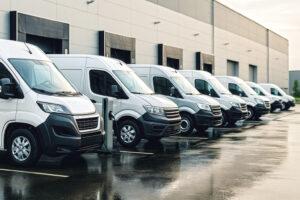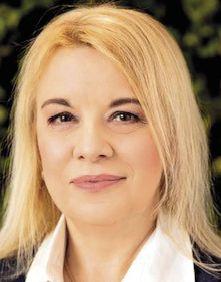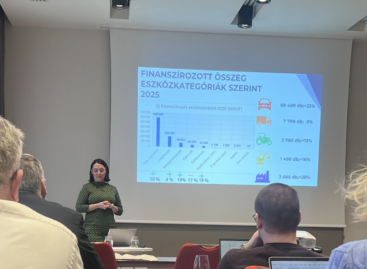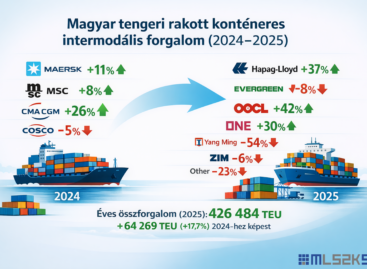Companies are waiting, calculating and delivering – new room for manoeuvre on the fleet market
A cikk a Trade magazin 2025/8-9. lapszámában olvasható.

Tímea Pesti
CEO
Ayvens Magyarország
“Nowadays, it is increasingly difficult for both large companies and SMEs to plan for the long term, so they are making even more conscious decisions: they are monitoring inflation, customs duties, exchange rates and interest rates”,
says Tímea Pesti, CEO of Ayvens Magyarország.
In a climate of uncertainty any solution that makes vehicle usage costs predictable is highly valued, so companies show growing demand for transparency and the elimination of hidden costs.
It is often the conditions that are rejected

Tamás Varga
fleet strategy manager
C Automobil Import
“Vehicle procurement often isn’t realised because of the conditions. Companies are primarily held back by rising vehicle usage costs (servicing, comprehensive insurance), paired with the effects of extra taxes and the margin freeze”,
explains Tamás Varga, fleet strategy manager of C Automobil Import Kft.
He adds that full-service packages are the most popular, because the mandatory servicing and replacement of wear and tear parts during the term of the contract make the costs predictable.

Sponsored illustration
Adaptation is a must – fine-tuning instead of explosive growth

János Ayhan Güngör
fleet manager
Grand Automotive
Central Europe
“The market isn’t booming, but it isn’t collapsing either – it is stagnating and market players must adapt to this”,
says János Ayhan Güngör, fleet manager of Grand Automotive Central Europe Kft.
As the domestic importer of the Nissan and Maxus brands, he believes today the focus shouldn’t be on spectacular growth in sales figures, but on strengthening positions and fine-tuning processes.
There is a growing demand from companies for solutions with a lower environmental impact, accompanied by a clear shift towards usage-based models.

Procurement decisions today are primarily influenced by conditions and operating costs; full-service packages are the most sought-after
The future is about customer experience

Zsuzsanna Medve
head of corporate sales
MOL Mercarius
Zsuzsanna Medve, head of corporate sales at MOL Mercarius:
“There is growing demand for more flexible access to vehicles and related services, shorter terms and also for more flexible contract termination. This is because of the often seasonal and periodic nature of the industry”.
She adds that for customers the service they receive is more valuable than owning the asset.
Accordingly, there is great demand for complex solutions that combine a vehicle with a comprehensive service package for a predetermined period
Thinking as a strategic partner

Aleksandra Banovic
commercial director
MHC Mobility
Magyarország
Today fleet management is about much more than just vehicle procurement and maintenance.
According to Aleksandra Banovic, commercial director of MHC Mobility, customers increasingly see their service provider as a strategic partner from whom they expect not only equipment, but also operational reliability and predictability.
“Currently, many companies aren’t increasing the size of their fleets, but their service expectations are growing”,
she says.
This is the reason why MHC accompanies partners throughout the entire life cycle: from vehicle selection to term and mileage planning.

András Kovács
director
Volkswagen
Haszon járművek
Selling vehicles and retaining partners are both crucial
Fleet sales don’t end with the handover of the car: the real value begins when the vehicle starts working.
According to András Kovács, director of Volkswagen Commercial Vehicles, in the current market environment it is especially important not only to sell, but also to operate and retain customers in the long term.
“Owing to the uncertain economic outlook, companies are often postponing their investments, so the Hungarian market is shrinking month by month”,
he reveals.
One of Porsche Hungaria’s key services is the Smart Care package.
Commercial vehicles can’t wait

Tibor Szilveszter
sales and
marketing director
Mercedes-Benz
Haszonjárművek
We learn from Tibor Szilveszter, sales and marketing director of vans at Mercedes-Benz that fleet operators are no longer just looking at the technical characteristics of vehicles, but also at how a given model can be integrated into the company’s operations.
Fleet expansion decisions are preceded by increasingly complex financial calculations. Interest in electric drive is strongest in the urban and regional logistics segment.
The freedom of renting: usage instead of waiting

Zsombor Páll
managing director
VIARENT
Viarent is, a member of the Delta-Truck group and one of the largest rental companies in the sector.
According to managing director Zsombor Páll, these days companies don’t necessarily want to own vehicles: they wish to buy guaranteed operation with flexible terms.
“Many firms are still waiting to see what will happen, they don1t want to commit long term, so they are looking for shorter rental arrangements that don’t tie up a lot of capital, but still ensure business continuity”,
he explains.
Stagnating market, intensifying price competition
“Sales of new vehicles have remained virtually unchanged on the commercial vehicle market for three years. This clearly reflects the stabilisation of the segment, but also caution on the demand side”,
points out István Szabó, fleet expert of the Gablini Group.
Corporate customers are making more conscious decisions, in many cases waiting or significantly prolonging the decision-making process. The competitiveness of fleet partners is primarily determined by how flexible and personalised their solutions are.

The state incentive program for electric LCVs triggered a short-term spike in demand; however, market interest has tapered off since late March
Financing: lack of vehicles isn’t the main obstacle
László Kőszegi, secretary general of the Hungarian Leasing Association:
“In commercial vehicle financing the bottleneck today isn’t supply, but caution in investing. Due to high interest rates, cost and market uncertainties, many firms prefer to extend the life of their existing fleets – even if they are less efficient”.
Service providers are adapting their products accordingly, with flexible terms, customised structures and predictable cost packages.
Thinking in a new system
Ayvens – formerly ALD | LeasePlan – has signed a cooperation agreement with the Chinese brand BYD for Hungary and six other European countries. The goal is to make BYD’s electric vehicles available to corporate customers through fleet management and long-term leasing arrangements.
New dynamics in intermodal and sustainable transport

On 31 July the Minister of Energy issued Decree No. 18/2025 (VII. 31.), which creates new opportunities for operators in the transport sector under the Energy Efficiency Obligation Scheme (EKR). Among other things, the new regulations make it possible to replace obsolete trucks, forklifts, buses and locomotives with more modern, energy-efficient vehicles. Another significant change is that the duration of the funding period has increased from one year to six years, encouraging market players to make a long-term commitment. This can motivate companies that used to be reluctant to invest in the development of intermodal logistics in the long term.
Fleet risks in numbers – based on customer feedback
According to MHC Mobility’s 2025 national fleet survey, 54% of companies experienced delivery delays in the past year, 40% said operational predictability had decreased and 32% opined that business risk surrounding their fleets had increased.
Waiting or expanding? Leasing market at a crossroads
According to the latest data from the Hungarian Leasing Association, in the first half of 2024 the amount financed grew by 19% compared to the same period last year, while the number of contracts dropped 7%. Rationalization is especially strong in the commercial vehicle segment, while a wait-and-see attitude can be observed in the passenger car fleet category.
(Source: Hungarian Leasing Association – press release, July 2025)

Related news
Stagflation and structural erosion in transportation: the profit recession of the Hungarian SME transportation sector has been going on for nine quarters
🎧 Hallgasd a cikket: Lejátszás Szünet Folytatás Leállítás Nyelv: Auto…
Read more >Imports drove growth in sea container traffic in 2025
🎧 Hallgasd a cikket: Lejátszás Szünet Folytatás Leállítás Nyelv: Auto…
Read more >Related news
Festival buzz at the 60th anniversary EuroShop trade fair
🎧 Hallgasd a cikket: Lejátszás Szünet Folytatás Leállítás Nyelv: Auto…
Read more >No matter how much you save, food and gadgets always take the money
🎧 Hallgasd a cikket: Lejátszás Szünet Folytatás Leállítás Nyelv: Auto…
Read more >Historic price reduction at ALDI
🎧 Hallgasd a cikket: Lejátszás Szünet Folytatás Leállítás Nyelv: Auto…
Read more >







